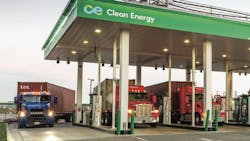Roeth: Where natural gas fits in decarbonizing trucking
Recently, there seems to be a renewed interest in natural gas as a fuel to power commercial vehicles. This is partly because natural gas has the potential to help reduce total greenhouse gas emissions. In addition, it reduces some of the local health effects caused by air pollutants like NOx and particulate matter.
The ability to produce more renewable natural gas has also contributed to the resurgence of interest in natural gas. An interesting fact is that renewable natural gas totaled 69% of the natural gas used in transportation in 2022.
As with any technology, there are pluses and minuses when choosing natural gas for commercial vehicles. The obvious big plus is that natural gas can be a near-zero solution. Another is that there is already some fueling infrastructure in place where natural gas vehicles can refuel. In the case of renewable natural gas, it can achieve negative carbon intensity if the feedstock source is animal waste.
One drawback of natural gas is that it is less efficient than diesel. Natural gas is also lighter than air, which raises concerns about maintenance. Shop facilities will need to be modified so that technicians can work safely on natural gas-powered trucks.
See also: NACFE releases report on the viability of fleets fueled by natural gas
One promising development in the natural gas space is the recent introduction of the Cummins X15N engine. The X15N is expected to have improved fuel economy compared to the ISX12N by up to 10% for equivalent torque and duty cycle, partly because of its improved torque. Since Cummins says that the power and torque curve of this engine is almost identical to those of diesel, that should address one of the concerns fleets have had regarding natural gas engines.
Natural gas may be a good option for fleets that include long-haul disparate routes, a duty cycle for which battery-electric vehicles do not make sense today.
One note of caution. Converting to natural gas is a long-term decision. It can take five to 10 years for fleets to see payback from their investment in natural gas vehicles and infrastructure. Therefore, when evaluating natural gas, fleets should compare it to diesel and other alternatives. Fleets need to be aware that during the time it takes for their investment in natural gas to pay off, there could be significant improvements in battery-electric vehicles that could make them more attractive. Having invested in natural gas, fleets may be unable to pivot to take advantage of the benefits of battery-electric vehicles.
Natural gas is part of trucking’s messy middle. If you want to learn more about how it might fit into your operation, our Confidence Report, Natural Gas’ Role in Decarbonizing Trucking, is a good place to start your research.
About the Author

Michael Roeth
Executive Director
Michael Roeth is the executive director of the North American Council for Freight Efficiency. He serves on the second National Academy of Sciences Committee on Technologies and Approaches for Reducing the Fuel Consumption of Medium and Heavy-Duty Vehicles and has held various positions with Navistar and Behr/Cummins.
